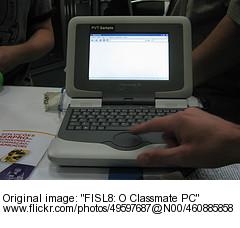I've been really pleased with the way our upper primary laptop program has been going over the last month. We purchased 20 x $800 Acers that have been excellent performers and handling the wireless network extremely well in the classroom. They shipped to us with Vista so once our tech prised that OS off and re-imaged with the department's standard XP image (he also snuck a Linux alternative under the hood - Ubuntu, I think, but I'm no hands on FOSS expert) we were ready to go. We've been sharing this small fleet across 4 classrooms so timetabling equitably has been interesting to say the least. I can safely say that as the laptop carts get locked to the floor in my room means that my class gets access when other teachers pass on their timeslot. And really the more opportunity I have to use these tools with my class, the more time I want to have them there available for whenever they might be needed - not be dependent on waiting for the next timetabled slot.
$800 is a pretty cheap laptop - considering it's got all the bells and whistles of any student desktops around the place. But if the price barrier can go lower and the excess features curbed, then maybe more laptops can be there on the ready. It's probably leading eventually to a 1:1 laptop program which would be a significant step in this large government run system. I know many private schools have been down this route much earlier (my Victorian blogging colleague, Warrick Wynne says he wouldn't work in a school without one to one) but in this state, the dollars and government tech commitment haven't stretched that far. So, laptops suitable for the primary school classroom at a competitive price, stripped of unnecessary features and running open source software are what the focus should be on because even at $800, there isn't enough dollars in a typical state school budget to keep going down the regular sized laptop trail.
There's been plenty blogged about smaller, cheaper, un-bloated laptops that are surfacing on the market. Bill Kerr's blogged quite a bit about the OLPC project and recently compared it to another newcomer in the mini-laptop for education market, the Asus EEE. Interestingly, I saw one in a Myer department store catalogue for A$499.00 which I think is still too high a pricetag to be a contender. Whether a school or even an education system buying in bulk could drive that down figure would be interesting to see. Plus the word seems to be that if you're not prepared to use the standard Linux OS, the alternative XP tends to re-bloat and run slow. The other laptop mentioned is the Intel Classmate, which Bill has also analysed from a vision/marketing strategy point of view. Meeting with someone from higher up in the ICT department of our system, we had an offer to have a look at one of these machines to make a hands on assessment of its suitability. That would be worth blogging when and if it happens. I have no idea what these might cost per unit but it seems that Intel are only selling direct to government agencies so it would take a commitment from my own state system before the Classmates could be a common sight in primary school classrooms or appear as a booklist item.
One of the criticisms I've heard which will get OLPC advocates up in arms (and rightly so) is the assertion from some educators that the mini-laptops look like toys, kids won't like them and take to them because they "don't look like real computers" or because they aren't Windows based and will be a mystery to the majority of teachers trying to weave their use with their students. In a conversation I had with Peter Ruwoldt recently, he pointed out that the OS and power of the laptop will be less important than a strong pipe connection to the internet where browser base applications and storage will enable education systems to shift costs offline and onto the big web giants' servers.  So, I'd take as many laptops of whatever description I could - as long as I can get them to connect to the wireless network, access whatever of the filtered web is currently allowed, my students have a better chance of just-in-time digital learning in the classroom. A good example is how much more was achieved in our Spin The Globe wiki project once we had regular laptop access. Going off to the computer lab or being IWB spectators does not compare to having the laptop on the student's desk being used as part of their regular school day.
So, I'd take as many laptops of whatever description I could - as long as I can get them to connect to the wireless network, access whatever of the filtered web is currently allowed, my students have a better chance of just-in-time digital learning in the classroom. A good example is how much more was achieved in our Spin The Globe wiki project once we had regular laptop access. Going off to the computer lab or being IWB spectators does not compare to having the laptop on the student's desk being used as part of their regular school day.
